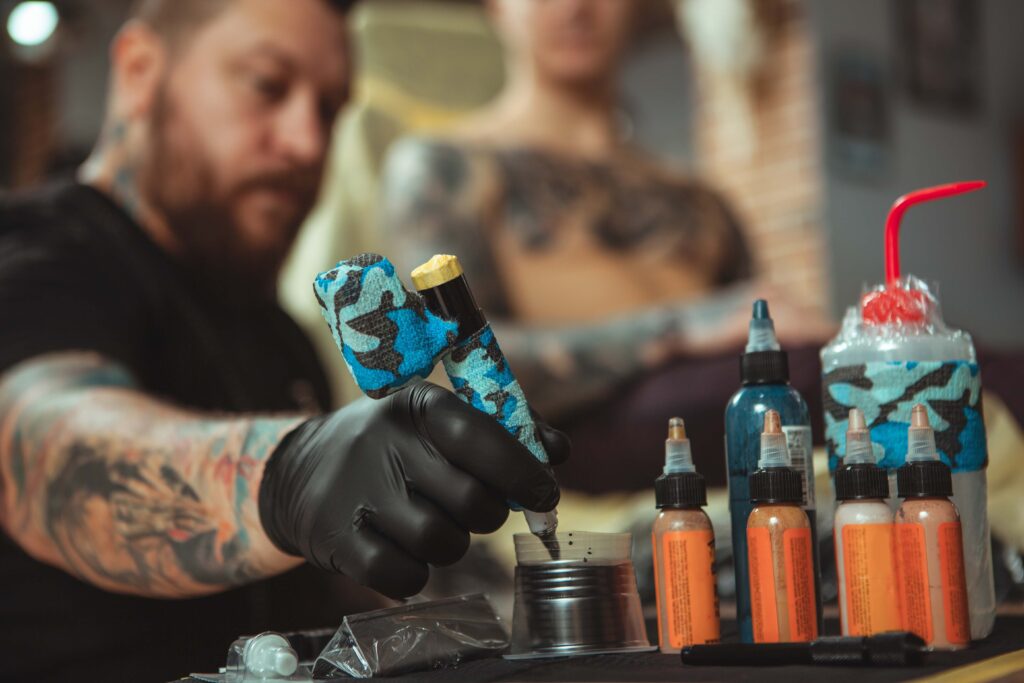
What is a Tattoo?
A tattoo is a body modification involving the injection of pigments, dyes or ink into the skin that is done for numerous reasons – or no discernible reason at it. It can be done to create a shape, symbol, image, picture, message, artwork and more. Tattoos have also been used for cosmetic and reconstructive purposes such as for eye or lip liner and even for reconstructing nipple-areola complexes in breast reconstruction.
Prevalence of Tattoos Now
Over the last several decades, tattoos have become far more acceptable and popular to have. No longer are they just largely seen on ex-military, convicts, sailors and gang members. Now they can be regularly seen on the Kaitlyns, Madisons, Emmas, Tiffanys, Dylans and Daniels of the world.
According to Pew Research, which conducted a study regarding tattoos in 2023, 38% of women and 27% of men in the United States have tattoos. When categorized by age and sex, 56% of women from ages 18 to 29 have them while 53% of women from age 30 to 49 have them. A whopping 68% of lesbians sport tattoos.
Overall, 46% of Americans from ages 30 to 49 have tattoos whereas only 13% have them in the 65 and older age group.
Clearly, tattoos have become quite prevalent.
How is a Tattoo Done?

Tattoo machine
A tattoo is created by injecting ink/pigment into the dermis of the skin using an electric tattoo machine. This has reciprocating needles that can puncture the skin up to 3,000 times per minute, allowing for the deposition of the ink.
The procedure is performed without the use of local anesthesia so it can be uncomfortable. Reusable items should be sterilized due to the risk of infections including serious ones as previously noted. However, this is not universally done all the time.
What is in Tattoo Ink?
The composition of tattoo inks is much of a mystery. That is, we don’t truly know all the ingredients that are in them. Shockingly, neither do the manufacturers nor does any regulatory agency.
It turns out that the manufacture and usage of tattoo inks is essentially unregulated in the United States. Manufacturers are not even mandated by any governmental agency, including the FDA (Food and Drug Administration), to disclose the ingredients. In Europe, however, far more regulation of tattoo inks exists. There, it has been required to have labeling of ingredients though such information has been inaccurate and incomplete. Unfortunately, there are often unlisted agents some which have been linked to cancer, causing damage to DNA or even causing allergic reactions.
Several hundreds of brands of tattoo inks are manufactured and their compositions are all different. More than 50% have been found to contain pigments that can release aromatic hydrocarbons and other chemicals which are considered to be carcinogenic. Many contain toxic heavy metals including mercury, cadmium arsenic, chromium, cobalt, lead and nickel. Incredibly, some have been discovered to contain industrial grade pigments (azo) such as used in car paints.
Yikes!
Something quite significant to think about when considering getting a tattoo.
Known Risks of Tattoos
There are well-known health risks of getting a tattoo – some short term and relatively minor, others long term and possibly quite consequential. These should definitely be considered when you are making that all important decision to have something done on yourself that will essentially be irreversible.
Commonly known, non-aesthetic risks related to having a tattoo include:
- Skin infections. This can be related to non-sterilized or improperly sterilized tattoo equipment, contaminated ink and lack of appropriate antiseptic technique for skin preparation.
- Systemic infections. This can occur when the tattooing equipment used has not been properly sterilized. More significant risks include hepatitis B, hepatitis C, HIV and methicillin resistant Staphylococcus aureus (MRSA) infections.
- Allergic reactions to tattoo ink. This can occur at any point after getting a tattoo – even years later. Red ink has the highest risk for this occurrence.
- Intrinsic skin issues. Granulomas (areas of inflammation) can form. Keloids, thick and enlarging scars, can also develop.
Previous Studies on Tattoos and Cancer
For years, concerns have been raised about the possible relationship of tattoos and cancers. After all, the tattoo inks are known to contain toxic and carcinogenic chemicals, dyes and metals. Having arsenic, lead or mercury electively injected into one’s tissues just doesn’t seem like a prudent, healthy choice. Knowing what these and other toxic agents in tattoo ink can do and have even been shown to do in animal studies should be quite a cause for concern.
There has been speculation for a long time about tattoo inks being a causative factor in the development of skin cancers. A study published in The Lancet Oncology in 2012 performed an extensive literature review and found 50 skin cancers arising in tattoos. These included basal cell carcinomas, squamous cell carcinomas, malignant melanomas, keratoacanthoma and malignant melanomas. However, based on the numbers and other factors, it was concluded that the presence of these skin cancers was likely to be a coincidence rather than related to a causation from the tattoo ink. A few other studies published since them were also inconclusive with regard to any relationship.
No other types of cancer have been definitively shown to be associated with tattoo ink though there has been speculation.
…until recently.
Tattoos, the Immune System and Lymphoma
Tattoo ink present in the body is identified by our immune system as foreign so it mounts an immune response against it facilitated by white blood cells called lymphocytes. This results in many ink particles being removed from the injection site by these cells and then transported to the lymph nodes where the particles accumulate and cause inflammation.
Can this increasing deposition of toxic particles in the lymph nodes lead to a relatively rare cancer – malignant lymphoma?
A study done by researchers at Lund University in Lund, Sweden sought to investigate this. The results were ultimately published in the journal of eClinicalMedicine in May 2024. This involved a very large study population along with case matched controls.
Without going into all the boring details, the findings were as follows:
- There was found to be a 21% increased risk for the development of malignant lymphomas in those individuals who had tattoos versus those that did not.
- The risk of development of a lymphoma had no correlation with the total size of the tattoo(s).
- The duration of having the tattoo was important. Individuals who had their first tattoo(s) for less than 2 years had the highest risk for developing malignant lymphoma followed by those who had it/them for 10 or more years.
Tattoos and You
In reality, when contemplating getting a tattoo there is actually quite a lot to think about – including significant risks to your health that include cancer. Most individuals, however, don’t put much thought into this aspect of tattoos – or other aspects, for that matter.
Based on the multitude of risks to one’s health that tattooing and tattoo ink present, perhaps individuals should give more serious thought at least to this issue before pursuing one or more.
Steven H. Turkeltaub, M.D. P.C.
Scottsdale and Phoenix, Arizona
